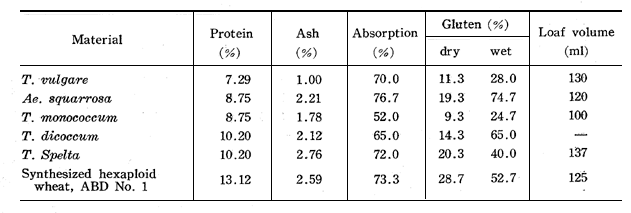K. YAMASHITA, M. TANAKA, M. KOYAMA and The Biology Group of the Doshisha Women's College
Biological Laboratory, Kyoto University, Kyoto, Japan
According to the genome analysis, Dinkel wheat involves 3 different genomes, namely A, B and D. Triticum monococcum belongs to the diploid species with AA and Aegilops squarrosa with DD, while the diploid species with BB has not yet been discovered. The present writers are very much interested in the studies on the quality of these species. The experiments are still in early stages but the preliminary results will be reported here. A report, "Milling and Baking Tests of Einkorn, Emmer, Spelta and Polish Wheat," was published by J. A. LeClerc, L. H. Bailey and H. L. Wessling (1910). Yamashita (1953) also studied on the quality of Triticum monococcum, while there are no reports for either Ae. squarrosa or the synthesized hexaploid wheats.
Materials used here are Ae. squarrosa, T. monococcum, T. dicoccum, T. vulgare, T. Spelta and the Synthesized hexaploid wheats (ABD No.1). The Kjeldahl method was adopted for the chemical analysis of the quality. The results are given in the following table.

The appearance of the loaf of Ae. squarrosa was poorer than T. vulgare, but when mixed with T. vulgare as to contain 11% protein, the loaf was soft as T. vulgare. The taste of the bread of Ae. squarrosa was good.